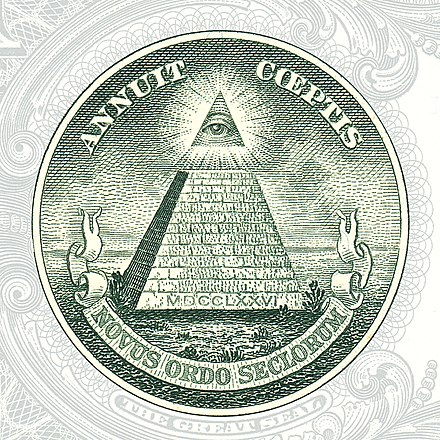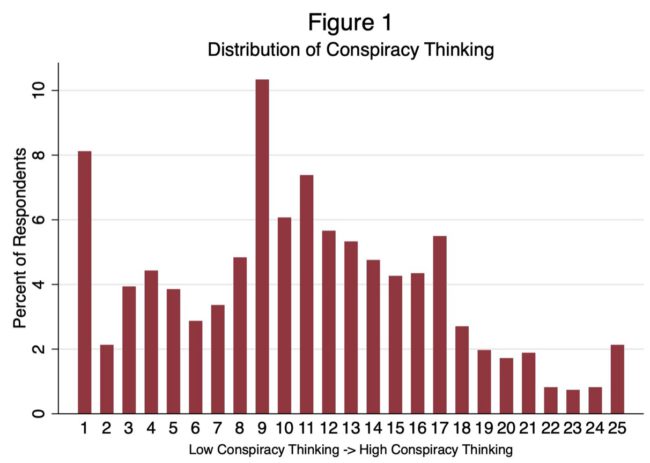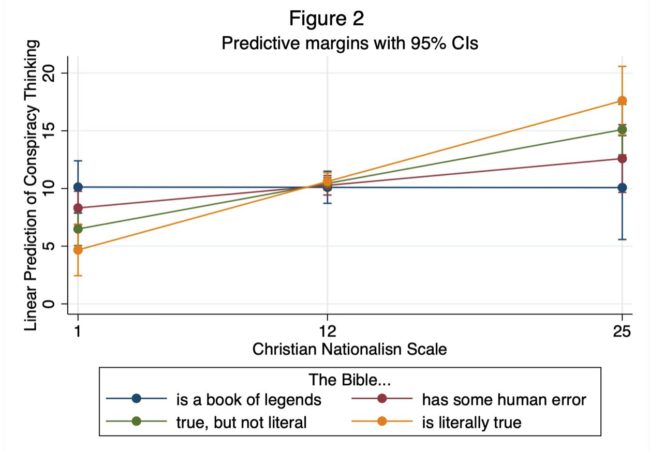
Thinking a specific way about things can render you to being susceptible to falling down the conspiracy rabbit hole.
This has been revealed by an interesting little paper that has recently been published. It reveals a connection between specific types of religious beliefs and conspiracy thinking.
Titled “Christ, Country, and Conspiracies? Christian Nationalism, Biblical Literalism, and Belief in Conspiracy Theories“, it was published May 8, 2023. – DOI: https://doi.org/10.1111/jssr.12836
What did the researchers behind this study do?
They presented eight well-known conspiracies to a group of respondents and asked them to indicate how strongly they agree of disagree that there has been a government coverup regarding each of the following. Play along and see how you feel about each …
- Alien encounters
- The 9/11 attacks
- Global warming
- The JKF assassination
- The moon landing
- The Illuminati/NewWorld Order
- Mass shootings, such as those at Sandy Hook, Las Vegas, and Parkland
- The South Dakota crash
What are your thoughts on each of those?
If you looked at that last one and wondered, “What the heck was that?“, then well done. They made that one up. They were curious to not only see who was susceptible to well-known popular conspiracies, but also who would be willing to buy into one they had just made up for their study.
They then blended the data that they had gathered to create a single index of conspiracy thinking for each respondent.
Why do that?
Somebody might indeed buy into some. Take for example JFK. If you have seen “that” movie then you might consider the conspiracy to be factual. Oh come now, you know the one, it is Oliver Stone’s 1991 movie that won awards, but was total fiction, yet managed to convince many that there really was some big conspiracy. As for the other’s perhaps not some much.
So the point is this, by combining all scores for all conspiracies, including the totally fake one, into one unified conspiracy thinking score, they measured how prone the respondents were to conspiracy thinking in general.
Here is the spread …

You can see the curve of percentages there that ranges from the well-grounded on the left all the way out to people who will buy any and every whacky claim that is on the market.
This is basically a measure of how committed people were to conspiracy thinking.
The other observation here is that in general terms, none of the conspiracies play all that strongly into a specific strand of politics. An example of one that was would have been is the “2020 election was stolen” claim. Measuring that would perhaps just measure your allegiance to a specific political tribe, so conspiracies like that were not considered.
But where does religion come into all this?
They were very specifically interested in looking at two specific strands of religious thinking …
Christian Nationalism: Those that adhere to this identity are people who claim the US was founded as a specifically Christian nation and only Christians should be running everything. It is a minority view. While obviously the majority of the US population are some variation of Christian, the vast majority do not embrace this specific line of thinking.
They speculated that there is a great deal of paranoia and insecurity in play within this group. Christian Nationalists feel that they are under attack and that nefarious forces are out to get them, hence people who specifically embrace this identity may indeed be very prone to falling prey to conspiracy thinking. Is that what the study found?
More on that soon.
Here is the other.
Bible Literalism: This is a way of interpreting the Bible. For this group the book of Genesis is literally true, God created planet earth and the entire universe in six 24 hours days roughly about 6,000 years ago, there was a world wide flood, etc… While the vast majority of Christians view it as metaphor or symbolism and thus see no conflict between established science and the text, there are some who reject our modern scientific understanding and opt to embrace Genesis as a literal factual description of actual historical events.
To give you a bit more context, there is a July 2022 survey by Gallup reveals that in the US 49% view the bible as just “inspired” and only 20% embraced it as “literal”. So, while not a tiny number, it is still a minority Christian view.
The issue here is this. Because the literalist view conflicts with the scientific view, people who embrace literalism tend to distrust both science and also the media. Does this then also render them more prone to embracing conspiracy thinking?
OK, let’s get into what the study found.
The Reveal
Oh come now, you can guess the answer, and yes, your guess would indeed be correct …
We find that Christian nationalism and biblical literalism independently predict conspiracy thinking, but that the effect of Christian nationalism increases with literalism.
In other words, the more respondents expressed alignment with either Christian nationalism or Biblical Literalism, the more probable it was that they also embraced conspiracy thinking as factual.
For individuals who embraced both beliefs, the impact was rather potent. They were far more inclined to grasp any and every conspiracy that popped up, and that included the totally fake “South Dakota Crash” that the researchers created just for this study.
That’s seriously wild.
The following diagram illustrates the results …

The most interesting line is the orange one. Those are the people who believe the bible is literally true. The stronger their Christian nationalism was, the far greater their degree of Conspiracy Thinking was.
Why does any of this matter?
Understanding why some are far more prone to falling down the whacky conspiracy theory rabbit hole is a good question to ask.
The core idea being tested is that people who embrace ideas that nurture insecurity and grants them a view of the world in which they are being threatened makes them far more prone to also accepting conspiracy claims as factual. This study appears to confirm this idea It would also suggest that over time, as the currently popular conspiracies such as COVID denialism and QAnon wane, the fundamental susceptibility remains – Christian nationalists and Biblical Literalists are the people who will most probably buy the next whacky conspiracy theory, whatever it might be.
One Further Thought
A degree of caution is always warranted. The study establishes a correlation, not a causal relationship.
There is actually something deeper in play here, something a tad more fundamental. The thing that leads people to embrace Biblical Literalism and/or Christian nationalism, also leads them to conspiracy thinking in general.
What actually explains this?
As we humans navigate the world we tend to think analytically or alternatively we respond to things intuitively and embrace things that meet emotional needs, bringing comfort, certainty, relevance, and meaning. It’s not binary, we all do a mixture, but some are inclined to lean a bit more towards one or the other.
In other words, if you lean a bit more towards just grasping the things that bring you comfort, meaning, and also makes you feel special, and don’t really consider any of it analytically, then you will indeed rush to embrace things akin to Christian nationalism, Biblical Literalism and also Conspiracy theories about “them”.
On the other hand, if you prefer to know what is and is not actually true, then when faced with weird whacky claims, analytical thinking is for you.
It is not your fate to lean either one way or the other, you can indeed train yourself to be more analytical and thus become less susceptible to being conned.
No this is not my cue to try and sell you some self-help course or similar.
I grew up religious and will openly admit to being rather gullible as a teenager. I was into lots of whacky crazy things … ghosts, aliens, ley lines, and of course God. Over time I developed a degree of skepticism and learned to apply critical thinking to some of the deeply fringe ideas I had previously accepted as true. By being curious and looking I discovered that specific things I had accepted were not actually true at all and realised I had been conned about that … but of course all these other things were of course true.
In many ways it feels like being a deep sea diver who is slowly rising and stopping to decompress, until one day I broke surface and discovered to my complete astonishment that I no longer believed any of it because none of it had any credible evidence at all.
Am I now on a mission to fix the world?
Well no, I also needed to make peace with the fact that humans are the way they are. We love to tell each other stories and tickle each others brains with weird and wonderful stuff. For some it is entertainment, but for others it becomes “truth”. My story is the assurance that you need not remain a prisoner of such thinking, you can break free.
To put all that another way, nurture critical thinking because it is a path that will lead you to better far more robust insights and conclusions, and also grants you a degree of resilience to being the plaything of charlatans and grifters.
Life is in many ways the ultimate gullibility test.
Further Reading
What would you recommend to somebody who is interested in developing their critical thinking skills?
Here are a few thoughts …
- Wikipedia – Critical Thinking
- The Baloney Detection Kit: Carl Sagan’s Rules for Bullshit-Busting and Critical Thinking
- Podcast: The Skeptics Guide to the Universe
- You are Not So Smart
If somebody asked you for suggestions then what would you also recommend? (Please do drop a comment or two so that others can pickup tips)

What about the conspiracy that people can change sex?